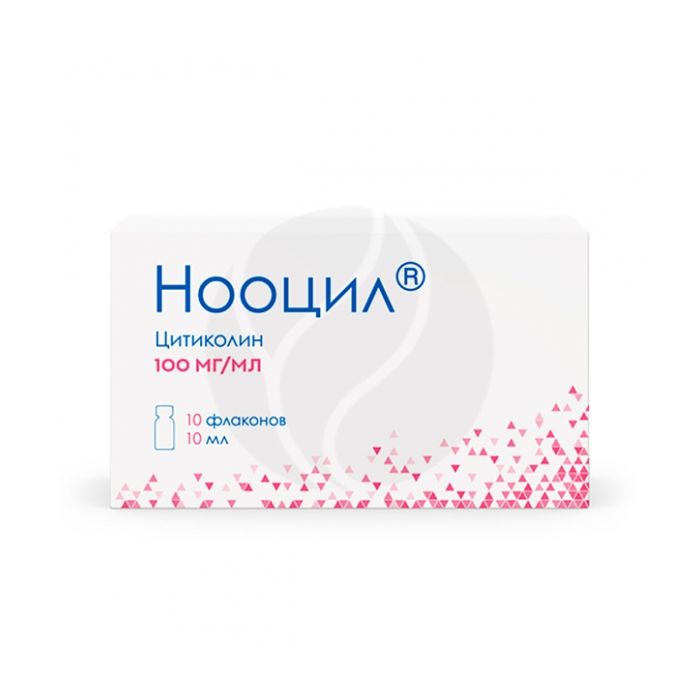Noocil oral solution 100mg / ml, 10ml No. 10
Expiration Date: 05/2027
Russian Pharmacy name:
Нооцил раствор для приема внутрь 100мг/мл, 10мл №10
Ischemic stroke (acute period);
ischemic and hemorrhagic stroke (recovery period);
traumatic brain injury (acute and recovery period);
cognitive impairment in degenerative and vascular diseases of the brain.
When taken orally - 200-300 mg 3 times / day.
citicoline
Vagotonia (predominance of the tone of the parasympathetic part of the autonomic nervous system);
children and adolescents up to 18 years old;
hypersensitivity to citicoline.
pharmachologic effect
Nootropic agent. Citicoline, being a precursor of key ultrastructural components of the cell membrane (mainly phospholipids), has a wide spectrum of action: it promotes the restoration of damaged cell membranes, inhibits the action of phospholipases, preventing the excessive formation of free radicals, and also prevents cell death by affecting the mechanisms of apoptosis. In the acute period of stroke, it reduces the volume of damaged tissue, improves cholinergic transmission. With traumatic brain injury, it reduces the duration of post-traumatic coma and the severity of neurological symptoms. Citicoline improves the symptoms observed during hypoxia: memory impairment, emotional lability, lack of initiative, difficulties in performing daily activities and self-care. Effective in the treatment of cognitive,sensory and motor neurological disorders of degenerative and vascular etiology.
Pharmacokinetics
Since citicoline is a natural compound that is found in the body, a classical pharmacokinetic study cannot be performed due to the complexity of the quantitative determination of exogenous and endogenous citicoline.
Side effect
From the nervous system: insomnia, headache, dizziness, agitation, tremors, numbness in paralyzed limbs. From the digestive system: nausea, decreased appetite, changes in the activity of liver enzymes. Allergic reactions: rash, itching of the skin, anaphylactic shock. Others: fever; in some cases - a short-term hypotensive effect, stimulation of the parasympathetic nervous system.
Application during pregnancy and lactation
During pregnancy, use is possible only if the expected benefit of therapy to the mother outweighs the potential risk to the fetus. If it is necessary to use citicoline during lactation, the issue of stopping breastfeeding should be resolved, since there are no data on the excretion of citicoline in breast milk.
Application in children
Contraindicated in children and adolescents under 18 years of age.
Use in elderly patients
Application is possible according to indications.
special instructions
Citicoline should not be used concurrently with drugs containing meclofenoxate.
Drug interactions
Citicoline enhances the effects of L-dihydroxyphenylalanine.

